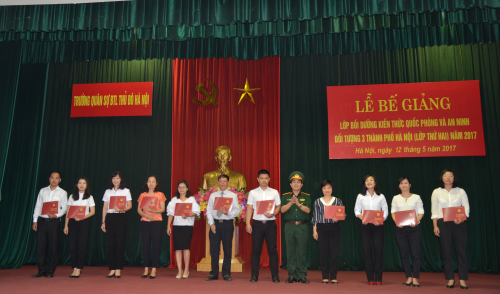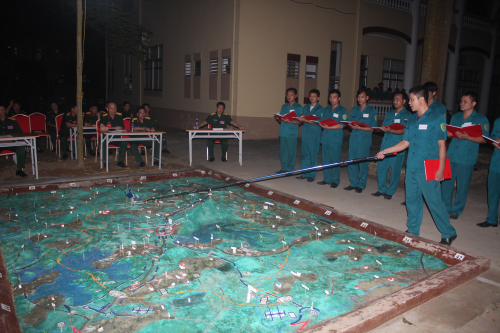The Military School of Hanoi Capital City Command successfully conducts the work of defence and security education
While training cadres and non-commissioned officers for the local armed forces, the Military School of Hanoi Capital City Command (hereafter the School for short) is tasked with providing defence and security education for cadres of the 2nd and 3rd groups within Hanoi city’s area. Due to a large number of learners from various groups, limited facilities, particularly accommodations, lecture halls, and training grounds as well as a dearth of instructors, in order to fulfil its task of education and training in general, the task of defence and security education in particular, the School’s Party Committee and Board have synchronously taken various measures to promote the synergy of forces in the process.
 |
| Sr. Col. Nguyen Kim Hong handing the certificate of defence and security education to excellent learners of the 3rd group in 2017 |
First of all, the School has thoroughly grasped the resolutions, directives and guiding documents by the Party, Government and higher echelons on defence and security education, while enhancing the leadership and direction of all-level party committees and organizations and commands over this important work. Grounded on the 9th Politburo’s Directive 12-CT/TW, the Law on Defence and Security Education, the Government’s Decree 13/2014/NĐ-CP, guiding documents by the Ministry of National Defence, and plans and guiding documents of the Municipal Council for Defence and Security Education, every year, the School’s Party Committee and Board issue resolutions on elaborating the targets, requirements and measures for defence and security education in accordance with reality and introduce them and assign specific tasks to each office, faculty and unit. At the same time, the School has pushed ahead propagation and education to raise the awareness and responsibility of cadres, instructors and employees towards defence and security education, while promoting the synergy of forces and organizations in leading, directing, coordinating, preparing, and conducting this important work.
Hanoi is a large city with many administrative units (including 30 districts and towns and 584 communes, wards and townships); therefore, the School has to take charge of providing defence and security education for a large number of cadres. Against that backdrop, the School has cooperated closely with offices of the Capital City Command and districts in classifying groups of cadres and developing the education plans in line with its facilities and contingent of instructors, submitted them to the Capital City Command for the approval. At the same time, it has advised the Municipal Council for Defence and Security Education on flexibly employing forms of education and holding the training courses both in the School and the districts. To that end, the School has been responsible for managing the contents and curriculum and used the instructors of both the School and localities. Reality has proved that holding training courses for cadres of the 2nd and 3rd groups both in the School and localities has been a proper, effective method which helps overcome the School’s difficulties in its facilities, ensure the fulfilment of the preset plans, and create a favourable condition for cadres to both attend the courses and perform the task in their offices and units. In 2018, it organized 4 courses in the School and 17 courses in localities and offices in the area with the participation of 1,462 learners. Moreover, it provided the additional knowledge of defence and security for 164 chairmen and deputy chairmen of communes, wards and townships, which was highly appreciated by the City and localities.
Cadres of the 2nd and 3rd groups are those who have good educational background and a lot of experience in their work. Thus, to make the work of defence and security education effective, the School has paid due regard to building its contingent of instructors, selecting and assigning those with good knowledge and methodology to take charge of teaching those cadres. To do so, the School has demanded to build a contingent of instructors. This contingent’s core includes members of the Board, leaders of departments and faculties, and cadres who held the regiment-level positions, and certificated instructors. At the same time, it has invited lecturers from the National Defence, Political, Border Guard, and People’s Security Academies to deliver key, specialized lectures. To unceasingly improve the professional competence of its instructors and make necessary preparations for the inception of the Centre for Defence and Security Education with a view to holding defence and security education courses for students of universities and vocational schools in the area (March 2019), the School has actively consolidated its contingent of instructors and further enhanced the quality of its cadres and instructors. While selecting its cadres and instructors for postgraduate courses in universities both inside and outside the Military, the School has actively dispatched its cadres and instructors to attend the refresher courses held by the Defence Education Department (Ministry of Education and Training) and the Capital City Command. At the same time, it has organized many specialized training courses on operational art and teaching theory and method for its instructors; maintained the order for good teacher competitions at all levels; suggested the Capital City Command to dispatch its cadres and instructors to work in localities and units and take part in defensive zone exercises to accumulate the knowledge and experience, thereby meeting the requirements for education and training. Between 2013 and 2018, the School dispatched 68 staff members for further education; 12 of them held the master degree and 16 of them were grated the teaching certificate. Up to now, 100% of its staff members have been capable of delivering the lectures under the curricular to cadres of the 2nd and 3rd groups.
 |
| Cadets trained to become heads of the commune-level military commands reporting the combat determination during a defensive exercise |
In addition, the School has increasingly renewed the training contents and curricular to ensure practicality and effectiveness. Grounded on the contents and curricular of defence and security education under the Decree 38/2014/TT-BQP by the Ministry of National Defence, it has undertaken researches and counselled higher echelons to develop and make the training contents and programs for cadres of the 2nd and 3rd groups relevant to the Capital City’s particularities and defence and security mission. At the same time, it has directed its faculties to actively update their instructors on the Party’s new guidelines and viewpoints, such as the National Defence Law, the National Defence Strategy, and the Strategy for the Homeland Protection in Cyber Space as well as include the experience in leading and directing the performance of the defence and security task in the City’s area in their topics and lectures in order to align theory with practice.
Besides, it has actively renewed the teaching forms and methods with learning playing the central role. To do so, it has demanded to push ahead methodological activities; 100% of lecturers must be approved by faculties and the Board; suggestions, solutions and conclusions in the lectures must be selective, focalized, systematic, specialized and practical. Instructors have been requested to further apply information technology to their lectures and raise the issues, organize discussions and associate theory with reality of offices and localities. As a result, lessons are always attractive and democratic, promote learners’ creativity, and encourage them to study and clarify the sensitive issues. This method is aimed at improving the effectiveness of learning and enabling instructors to receive many valuable opinions from learners for their future research and teaching work. In recent years, in the beginning of a course, the School has provided learners with all relevant documents and directed faculties to give learners instructions on self-study so as to align the training process with the self-study process. In each course, the School invites experts to deliver special topics about new knowledge and issues and organize trips for learners to observe practical operations, particularly the School’s defensive combat exercise intended for cadets who are trained to become heads of the commune-level military commands, thereby helping learners broaden their knowledge and apply theory to practice.
Besides, due attention has been paid to the work of logistics support for defence and security education. All preparations have been carefully made, including reception of learners, class arrangement, accommodation, material, class hall, training ground and document. During the courses, the School has strictly maintained the order and regulations, drawn lessons on all work stringently, reported each learner’s result of study to their office and locality as the basis for holding the following courses and raising learners’ awareness and responsibility for their study. In spite of difficulties in its facilities, the School has actively exploited and used effectively the investments and the existing system of class halls and combat training works to serve education and training. At the same time, it has stepped up the work of compiling documents and promoted technical initiatives and innovations during the training process. Since 2013, the School has fulfilled and applied 21 research works and technical innovation initiatives, compiled 39 textbooks, and put the Centre for Training Management, simulation shooting range, and many specialized classrooms and training grounds to use.
Adopting the measures synchronously, since 2013, the School has provided defence and security education for 554 cadres of the 2nd group and over 2,480 cadres of the 3rd group and assisted the districts and towns in organizing many training courses for cadres of the 4th group effectively, which has been highly appreciated by the Capital City Command and the Municipal Council for Defence and Security Education.
Bringing into play the attained results and experience, the School has been focusing its leadership and direction on making all necessary preparations for putting the Centre for Defence and Security Education to use as the basis for better fulfilling the task of defence and security education, deserving the trust of the Capital City’s Command, party committees, authorities and people.
Sr. Col. Nguyen Kim Hong, Commandant of the School